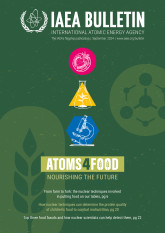The new rice variety can withstand higher temperatures and has a shorter growth period of 110–120 days instead of the usual 140–150 days. This creates an extended window for growing other crops and vegetables. The new variety produces nearly 7 tonnes of rice per hectare — nearly 75 per cent more than the global average yield.
BINA has also used plant mutation breeding to develop saline-tolerant rice varieties, providing hope for coastal farmers affected by saline soil conditions and soil degradation. Two saline-tolerant varieties are already available, and 40–50 per cent of previously fallow land can now be cultivated, improving food security and farmer income.
“The IAEA is working throughout Asia and the Pacific to support countries in applying nuclear based solutions to solve problems arising from changing climatic conditions. Through nuclear science and technology, the IAEA is able to support Bangladesh to improve its crop yields and help ensure food security,” says Deng Ge, Director of the Division for Asia and the Pacific at the IAEA’s Department of Technical Cooperation.
Plant mutation breeding is a nuclear technique in which plant seeds, cuttings or leaves are exposed to radiation such as gamma rays, speeding up the natural process of crop mutation. The irradiated material is then cultivated until it grows into a plantlet. The plants are multiplied and examined for favourable traits.
The new varieties help Bangladesh feed its 165 million people, almost a third of whom are food insecure. They have also enabled the country to maintain its status as the world’s fourth largest producer and consumer of rice.








